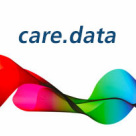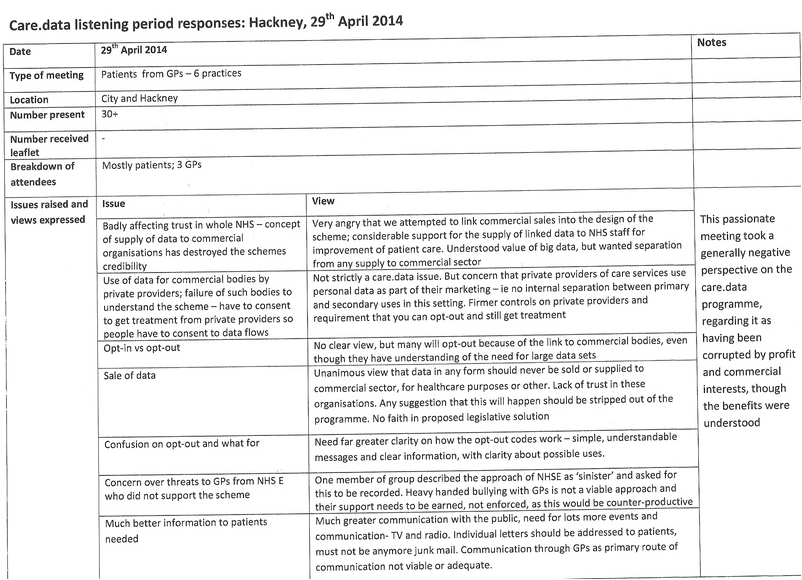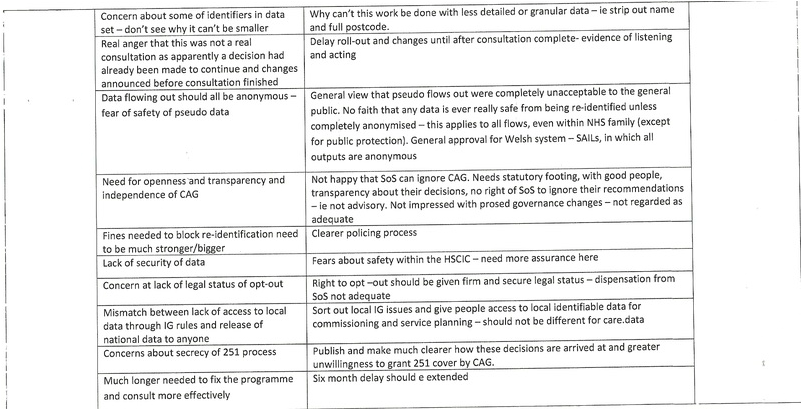
Care.data - Report of a Super PPG meeting for Hackney patients on 29th April 2014
held at Well Street Surgery, 28 Shore Rd, E9 7TA
Are you worried what will happen to your medical information?
The ‘care.data’ scheme means information from your GP medical records will be extracted. Patients and doctors from the Well St consortium expressed their concerns about how this information will be used. Speakers included: Robin Burgess Head of Intelligence for NHS London; Hackney GP, Dr Coral Jones and a Hackney patient
WELL Consortium members are; Elsdale St Surgery, London Fields Medical Centre, Lower Clapton Group Practice, Sorsby Health Centre, The Greenhouse Surgery, Trowbridge Surgery, Well Street Surgery, Wick Health Centre
held at Well Street Surgery, 28 Shore Rd, E9 7TA
Are you worried what will happen to your medical information?
The ‘care.data’ scheme means information from your GP medical records will be extracted. Patients and doctors from the Well St consortium expressed their concerns about how this information will be used. Speakers included: Robin Burgess Head of Intelligence for NHS London; Hackney GP, Dr Coral Jones and a Hackney patient
WELL Consortium members are; Elsdale St Surgery, London Fields Medical Centre, Lower Clapton Group Practice, Sorsby Health Centre, The Greenhouse Surgery, Trowbridge Surgery, Well Street Surgery, Wick Health Centre
Around 50 Hackney patients attended a ‘Super PPG meeting’ on 29th April to hear Robin Burgess, NHS London Head of Intelligence talk about care.data and to listen to patients’ views.
For Robin Burgess' own report of the meeting, scroll down the page.
Care.data is a system to collect detailed medical information on patients across England. Information is collected from general practice, hospitals and social services and matched in a database at the Health and Social Care Information Centre (HSCIC). Researchers can access the results and publish findings, but care.data also allows identifiable information about patients to be sent outside the NHS, including to commercial companies via third parties.
Burgess explained that medical data has been collected for years by hospitals, and the results sent outside the NHS without patient consent, which he was highly critical of. Care.data proposes to do the same thing- consent from patients will not be needed to send this information into the HSCIC, and from there to outside organisations.
There is currently a 6-month consultation period, with roll-out of care.data expected from October 2014. Meanwhile the Government has proposed some changes, in the form of amendments to the Care Bill. However we have not been told what these changes are; they pre-empt the consultation and no information has been given to allay patient and doctors’ fears about the release of confidential information.
Burgess highlighted the importance of big data sets in medical research – including research he personally led that required huge data sets from the UK, Australia and Sweden to reveal an increased risk of cancer and other problems from a specific artificial hip joint. The research led to this joint being withdrawn.
Hackney patient Deirdre gave an entertaining account of how companies use big data to extract detailed information about individuals, and linked this to the risk of commercial corporations (like insurance companies or employers) gaining access to individuals’ health data.
Hackney GP, Dr Coral Jones told the meeting that NHS England’s approach to care.data fails to fulfil the Government’s own requirements about informed consent, and GPs requirements to safeguard patient confidentiality. GPs are under pressure from NHS England to comply with government requirements on care.data and threatened with sanctions if ‘too many’ of their patients withdraw consent. The Information Commissioner’s Office has confirmed that GPs will be held responsible for any patient who complains they were not informed about how data from their medical records will be uploaded and shared, despite NHS England’s publicity campaign.
Dr Jones explained that alternative approaches to data collection are possible: for many years, the East London Clinical Effectiveness group has collected medical information from patients’ records for analysis and has fed this back to practices to improve treatment of long term conditions such as diabetes and heart disease. No identifiable information leaves the CEG. Similarly, the SAIL data system used in Wales collects the same information as care.data, from general practice, hospitals and social services, but no identifiable information ever leaves the central data collecting point.
In the discussion, the meeting heard that the NHS England care.data project lead, Tim Kelsey, has argued that patients simply don’t understand enough about care.data. There have already been major breaches of confidentiality as some hospitals have already released information to private corporations. The Chair of the Health and Social Care Information Centre has openly admitted it doesn’t know who has our medical data or what they are doing with it.
The Government’s Confidentiality Advisory Group has offered advice about how patient confidentiality can be retained – however the Group has an advisory role only and the Secretary of State can ignore their advice.
The meeting agreed unanimously that, while we appreciate the medical research benefits of huge data sets, patients do not consent to our medical information being passed to private corporations and we do not trust Government or NHS England to safeguard our confidentiality.
The meeting concluded:
For Robin Burgess' own report of the meeting, scroll down the page.
Care.data is a system to collect detailed medical information on patients across England. Information is collected from general practice, hospitals and social services and matched in a database at the Health and Social Care Information Centre (HSCIC). Researchers can access the results and publish findings, but care.data also allows identifiable information about patients to be sent outside the NHS, including to commercial companies via third parties.
Burgess explained that medical data has been collected for years by hospitals, and the results sent outside the NHS without patient consent, which he was highly critical of. Care.data proposes to do the same thing- consent from patients will not be needed to send this information into the HSCIC, and from there to outside organisations.
There is currently a 6-month consultation period, with roll-out of care.data expected from October 2014. Meanwhile the Government has proposed some changes, in the form of amendments to the Care Bill. However we have not been told what these changes are; they pre-empt the consultation and no information has been given to allay patient and doctors’ fears about the release of confidential information.
Burgess highlighted the importance of big data sets in medical research – including research he personally led that required huge data sets from the UK, Australia and Sweden to reveal an increased risk of cancer and other problems from a specific artificial hip joint. The research led to this joint being withdrawn.
Hackney patient Deirdre gave an entertaining account of how companies use big data to extract detailed information about individuals, and linked this to the risk of commercial corporations (like insurance companies or employers) gaining access to individuals’ health data.
Hackney GP, Dr Coral Jones told the meeting that NHS England’s approach to care.data fails to fulfil the Government’s own requirements about informed consent, and GPs requirements to safeguard patient confidentiality. GPs are under pressure from NHS England to comply with government requirements on care.data and threatened with sanctions if ‘too many’ of their patients withdraw consent. The Information Commissioner’s Office has confirmed that GPs will be held responsible for any patient who complains they were not informed about how data from their medical records will be uploaded and shared, despite NHS England’s publicity campaign.
Dr Jones explained that alternative approaches to data collection are possible: for many years, the East London Clinical Effectiveness group has collected medical information from patients’ records for analysis and has fed this back to practices to improve treatment of long term conditions such as diabetes and heart disease. No identifiable information leaves the CEG. Similarly, the SAIL data system used in Wales collects the same information as care.data, from general practice, hospitals and social services, but no identifiable information ever leaves the central data collecting point.
In the discussion, the meeting heard that the NHS England care.data project lead, Tim Kelsey, has argued that patients simply don’t understand enough about care.data. There have already been major breaches of confidentiality as some hospitals have already released information to private corporations. The Chair of the Health and Social Care Information Centre has openly admitted it doesn’t know who has our medical data or what they are doing with it.
The Government’s Confidentiality Advisory Group has offered advice about how patient confidentiality can be retained – however the Group has an advisory role only and the Secretary of State can ignore their advice.
The meeting agreed unanimously that, while we appreciate the medical research benefits of huge data sets, patients do not consent to our medical information being passed to private corporations and we do not trust Government or NHS England to safeguard our confidentiality.
The meeting concluded:
- Medical data should be available for bona fide medical research only
- An approach that keeps information detached from patient details is essential for overcoming concerns
- The Confidentiality Advisory Group must be replaced by an independent body that has the full confidence of patient champions and GPs, and which has statutory powers to determine how data should be used – and which cannot be overruled by the Secretary of State (except in the rare case of extreme health emergency).
- We asked for a copy of Burgess’ report of the meeting to be circulated to people at the meeting, and we thanked him for his attendance and useful information.
Below is Robin Burgess' report of the meeting. We think it represents a fair account of the views we expressed.



